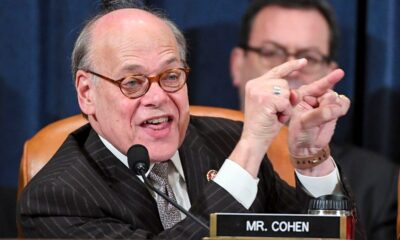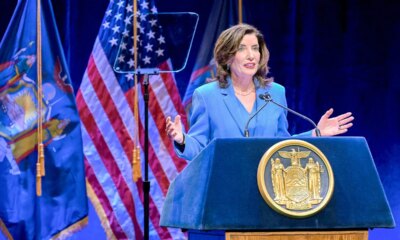Politics
Trump talks 'free speech' while moving to muzzle those he disagrees with

In one of his first acts in office, President Trump issued an executive order promising to end government censorship and restore free speech.
The order accused the outgoing Biden administration of harassing social media companies and violating the rights of average Americans “under the guise” of combating disinformation online, and said federal resources would no longer be used to “unconstitutionally abridge the free speech of any American citizen.”
The order echoed a recurring theme from Trump’s campaign — that liberals across the federal government are censoring conservative voices to advance their own “woke” agenda — and immediately resonated with his followers.
“This order is a critical step to ensure the government cannot dictate what speech is permissible or weaponize private entities to enforce censorship,” said Mark Trammell of the Center for American Liberty, a conservative rights group founded by California attorney Harmeet K. Dhillon, Trump’s nominee to lead the Justice Department’s Civil Rights Division.
However, many others said they found Trump’s order absurd — both because of his long track record of attacking speech he doesn’t like, and because of his new administration’s simultaneous efforts to muzzle people it disagrees with, including journalists, federal health officials, teachers, diplomats, climate scientists and the LGBTQ+ community.
“Let’s not be naive,” said Hadar Harris, the Washington managing director of PEN America, which has advocated for free speech in the U.S. for more than a century. “While some of President Trump’s flurry of executive orders pay lip service to free speech, in reality they frame a frontal assault against it, dictating the terms of allowable expression and identities, demanding political loyalty from civil servants, and threatening retaliation against dissent in ways that could cast a broad chill on free expression well beyond the halls of government.”
California Atty. Gen. Rob Bonta said Trump’s claiming to be a free speech champion while attacking the media and harshly restricting how longtime civil servants can communicate with the public — including in critical areas such as public health — was “ironic and hypocritical.”
“It’s classic Trump administration,” Bonta said. “It’s their rhetoric versus their actions, and you have to look at their actions.”
Limiting communication
Both at home and abroad, the Trump administration has ordered federal employees and diplomats to cease communications on a range of issues, including “diversity, equity and inclusion,” “environmental justice” and “gender ideology.”
It ordered Department of Defense officials to stop posting information on official social media accounts unless it is about the southern border, and health and other federal experts to limit communications even on critical public safety issues such as the spread of bird flu — which California officials have declared an emergency.
Dr. Jeffrey Klausner, a public health professor and infectious-disease expert at USC, said he was alarmed Thursday when the Centers for Disease Control and Prevention withdrew from a planned bird flu discussion with the Infectious Disease Society of America. Klausner said their pulling out was “a big loss for our ability to understand what’s going on” nationally.
Klausner said past administrations have given health leaders new orders — to curtail spending, shift priorities — but never such directives to halt so many critical communications at once. He called it “extremely concerning.”
Trump also has ordered a sweeping crackdown on federal communications about the LGBTQ+ community — removing LGBTQ+ resource materials from government websites and placing new restrictions on how federal employees can discuss or speak to LGBTQ+ people — or even use words such as “sex” or “gender.”
He has threatened similar restrictions on public school teachers and administrators, and ordered that LGBTQ+ Americans may no longer identify as transgender on passports and other documents.
Jenny Pizer, chief legal officer for the LGBTQ+ legal advocacy group Lambda Legal, said Trump’s orders are “the antithesis of free speech” and a clear government attempt to “silence people, to chill speech” — which is illegal.
She pointed to new rules barring federal employees, contractors and materials from referencing gender identity or fluidity. “Those concepts are being censored, and the language with which one articulates the concepts is being censored,” she said.
Lambda Legal has fought such efforts before. When Trump in 2020 issued an executive order barring federal grantees conducting workplace diversity training from referencing topics such as implicit bias or critical race theory — calling them “divisive concepts” — Lambda Legal and others sued and won an injunction blocking the order.
Trump has also kept up his criticism of the news media, calling journalists the “enemy of the people.” He is suing various media organizations — including the board of the Pulitzer Prizes and the Des Moines Register and its parent company, Gannett — over journalism he claims was libelous or unfair. The outlets have defended their work.
Katherine Jacobsen, U.S. program coordinator at the Committee to Protect Journalists, said journalists would welcome an honest effort to bolster free speech protections across the political spectrum, but Trump’s order isn’t that.
“What we’ve seen in this post-election period — and even before the election kicked off, in his last presidency — is that he hasn’t really been willing to support free speech when it counters his narrative,” Jacobsen said.
Online debate
At the core of Trump’s censorship order is his claim that the Biden administration “trampled free speech rights by censoring Americans’ speech,” including by “exerting substantial coercive pressure” on online platforms.
It is not a new argument.
After the Jan. 6, 2021, attack and multiple investigations into efforts by foreign adversaries to spread disinformation and sow distrust in the American political system, social media companies promised to crack down — including by suspending thousands of accounts. Under the Biden administration, officials kept up pressure on those platforms to take down posts the administration deemed false and dangerous, including about U.S. election integrity but also the COVID-19 pandemic.
Those efforts increasingly rankled Republicans and eventually Republican states sued, accusing the Biden administration of illegally coercing the platforms to erase conservative content.
Experts say claims of liberal bias on social platforms are generally overblown, and point to thriving conservative communities online as proof. However, surveys have shown that many conservatives believe that bias exists. And Meta’s chief executive, Mark Zuckerberg, recently lent credence to the claims by complaining publicly and to Congress about pressure his company received from the Biden administration to remove or limit the spread of certain content, including satirical content about COVID-19.
Lawyers for the Biden administration have said there is a difference between legitimate persuasion and inappropriate coercion, and that communication channels between government and social media companies had to remain open for public safety reasons. The Supreme Court ruled in favor of the Biden administration in June, finding the states had no standing to sue. Litigation around the issue persists.
In the meantime, tech leaders were shifting away from moderation — and toward Trump.
Elon Musk, the richest man in the world, purchased the social media platform X — then Twitter — in October 2022 on a promise to make it more free. He has described himself as a “free speech absolutist” and said Twitter wasn’t living up to its potential as a “platform for free speech” — which he said he would fix by loosening content restrictions.
Since then, Musk has joined Trump’s inner circle, spent more than a quarter of a billion dollars to help reelect Trump and Republicans in Congress, and been appointed by Trump to lead a new agency called the “Department of Government Efficiency,” raising all sorts of questions about conflicts given contracts Musk — also chief executive of SpaceX and Tesla — holds with the federal government.
Critics have also questioned Musk’s commitment to free speech. He has kicked journalists covering him off X and amplified conservative talking points on the platform. In September, X disclosed it had suspended nearly 5.3 million accounts in the first half of last year, compared with 1.6 million accounts it suspended in the first half of 2022.
Earlier this month, Zuckerberg of Meta — which owns Facebook, Instagram and WhatsApp — announced his company had allowed for “too much censorship” and would be getting rid of fact-checkers, reducing content restrictions and serving up more political content.
Zuckerberg then went on the popular Joe Rogan podcast, where he said corporate America had been “neutered” and “emasculated” and complained bitterly about Biden administration officials calling Meta team members to demand they take down certain content — while “threatening repercussions if we don’t.”
A host of other tech leaders in addition to Musk and Zuckerberg — Amazon founder Jeff Bezos and the chief executives of Apple, Google and TikTok — were on hand for Trump’s inauguration. Many also donated to the events.
Trammell, of the Center for American Liberty, said the Biden administration violated the rights of average Americans with such actions, and that Trump’s order “reaffirms America’s commitment to free expression.” Rep. Jim Jordan (R-Ohio), who as chair of the House Judiciary Committee has overseen investigations into social media bias, noted the anti-censorship order, among others, in a post on X, writing, “Common sense is back!”
Harris, of PEN America, said her organization agrees that “government censorship of speech is intolerable in a free society,” as Trump’s order states, and that the government must “take care” in how it addresses things like disinformation on social media platforms “so as not to infringe on free speech.”
However, the government “should be able to communicate and engage in information sharing with tech companies when disinformation is swirling online during a natural disaster, pandemic, foreign interference in an election, or other moment of heightened tension and risks to the public,” Harris said.
While purporting to defend speech already protected by the 1st Amendment, Trump’s order would make such necessary communication “impossible” and “limit the government’s ability to address disinformation at all,” Harris said — “giving disinformation free reign.”
Speaking out
Kate Oakley, senior director of legal policy at the pro-LGBTQ+ Human Rights Campaign, said while there are some legitimate restrictions on free speech — you can’t scream ‘fire!” in a crowded theater, for example — the Constitution already protects American citizens from the sort of government censorship that Trump purports to target with his order.
It also protects them from some of the things Trump’s other orders would usher in if implemented, she said.
“What he wants to do is make sure that speech or beliefs that are critical of him have less opportunity to be expressed, that speech or beliefs that are praising him have more ability to be out there, and to the extent that people are saying, doing, believing, reading things that he doesn’t approve of, he would like to shut that down and is taking actions to do so,” Oakley said.
But “our government does not get to tell us those things,” Oakley said, and groups such as hers are going to be using their voice to argue that point vociferously — including, if necessary, in court.
Bonta, California’s attorney general, said Trump is a “seasoned salesman” when it comes to saying one thing and doing another, but California will not be fooled and will also be calling out Trump’s anti-free speech actions and those that threaten public safety.
Pizer, of Lambda Legal, said legal intervention from groups like hers may not come immediately, as some of the orders are “still amorphous or theoretical enough that we can’t see what the effect will be.” But they are watching closely, she said, and already see the pain.
“The reality,” she said, “is that lovely, wonderful people who never did anything to hurt anybody are going to be suffering along the way as we try to shut this stuff down as fast as we can.”
Times staff writer Tracy Wilkinson in Washington contributed to this report.

Politics
Video: Trump Rejects E.P.A.’s Ability to Regulate Greenhouse Gases

new video loaded: Trump Rejects E.P.A.’s Ability to Regulate Greenhouse Gases
By McKinnon de Kuyper
February 12, 2026
Politics
Tim Walz demands federal government ‘pay for what they broke’ after Homan announces Minnesota drawdown

NEWYou can now listen to Fox News articles!
Minnesota Democratic Gov. Tim Walz is demanding that the federal government “pay for what they broke” after the Trump administration announced it would draw down its immigration enforcement presence in the Twin Cities.
During a press conference following Border Czar Tom Homan’s announcement that the administration would be ending its “Operation Metro Surge” in Minnesota, Walz said that federal law enforcement’s presence in the state was leaving “deep damage” and “generational trauma.”
“The federal government needs to pay for what they broke here,” said Walz. “There [is] going to be accountability on the things that happened, but one of the things is, the incredible and immense costs that were borne by the people of this state. The federal government needs to be responsible: You don’t get to break things, and then just leave without doing something about it.”
“So, we’re going to be asking the federal delegation to be investing and doing the things necessary,” he added.
TRUMP DHS HAMMERS DEM GOVERNOR’S PORTAL TO TRACK ICE AGENTS: ‘ENCOURAGES VIOLENCE’
Democratic Minnesota Governor Tim Walz speaks to reporters after he announced that he would not seek reelection, at the Minnesota State Capitol in St. Paul, Minnesota, U.S. January 5, 2026. (Reuters/Tim Evans)
Walz, who is best known for being former Vice President Kamala Harris’ running mate in the 2024 election, has been at odds with the administration throughout much of the operation, which was meant to crack down on rampant fraud and abuse in the state.
Regarding the federal drawdown, Walz said, “We are cautiously optimistic … that this surge of untrained, aggressive federal agents are going to leave Minnesota, and I guess they’ll go wherever they’re going to go.”
“The fact of the matter is, they left us with deep damage, generational trauma, they left us with economic ruin in some cases, they left us with many unanswered questions: Where are our children? Where and what is the process of the investigations into those that were responsible for the deaths of Renee and Alex?” he continued.
“So, while the federal government may move on to whatever next thing that they want to do, the State of Minnesota and our administration is unwaveringly focused on the recovery of what they did.”
HOUSE DEM EXPLODES ON TOP TRUMP IMMIGRATION OFFICIAL, SAYS HE ‘BETTER HOPE’ FOR PARDON FROM PRESIDENT
Anti-ICE protesters gathered in Minnesota on Saturday, Feb. 7, 2026. (AP Photo/Ryan Murphy)
Homan announced Thursday that the administration will conclude Operation Metro Surge in Minnesota. Homan told reporters during a news conference at the Bishop Whipple Federal in Minneapolis that the operation succeeded in reducing public safety threats with “unprecedented levels of coordination” from state officials and local law enforcement.
“As a result of our efforts here, Minnesota is now less of a sanctuary state for criminals,” Homan said, adding, “I have proposed, and President Trump has concurred, that this surge operation conclude.”
Homan said “a significant drawdown” of immigration agents was already underway and will continue through next week.
The border czar announced last week that 700 federal officers would leave Minnesota, though 2,000 officers will remain. He cited improved cooperation with jails and said a complete drawdown was the goal, but it was “contingent upon the end of illegal and threatening activities against ICE.”
ICE ARRESTS MURDERERS, PEDOPHILES DURING SUPER BOWL WEEKEND AS AGENTS SAY HALFTIME SHOW ‘DEMONIZED’ THEM
White House ‘border czar’ Tom Homan speaks during a press conference at the Bishop Henry Whipple Federal Building in Minneapolis, Minnesota, on February 4, 2026. (CHARLY TRIBALLEAU / AFP via Getty Images)
He said only a “small footprint of personnel” will remain for a period of time, while he will also remain on the ground to oversee the operation’s drawdown and success.
CLICK HERE TO DOWNLOAD THE FOX NEWS APP
“Additionally, federal government personnel assigned to conduct criminal investigations into the agitators, as well as the personnel assigned here for the fraud investigations, will remain in place until the work is done,” Homan said.
Fox News Digital’s Stephen Sorace contributed to this report.
Politics
Culver City, a crime haven? Bondi’s jab falls flat with locals

Conversations about Culver City — the vibrant enclave on Los Angeles’ Westside often called “the Heart of Screenland” — usually include phrases such as “walkable” and “green spaces” and “Erewhon.”
So when U.S. Atty. Gen. Pam Bondi insinuated the city of 39,000 residents is a crime haven during a heated exchange with Rep. Sydney Kamlager-Dove (D-Los Angeles) Wednesday, local officials and personalities responded with statistics, memes and wry mockery.
Bondi slipped in the jab near the end of an arduous House hearing largely focused on the Department of Justice’s handling of the Jeffrey Epstein investigation. Kamlager-Dove, whose district includes Culver City, hammered Bondi over deleted Department of Justice data linking far-right ideology with political killings, asserting that “there are violent, dangerous people out there with real threats.”
“There are — in your district,” Bondi responded. “Her district includes Culver City, and she’s not talking about any crime in her district. Nothing about helping crime in her district. She’s not even worth getting into the details.”
Hometown names stepped up to defend the burg by posting photos of clean streets, manicured parks and humming community events.
Political commentator and Angeleno Brian Taylor Cohen called the city “one of the most non-controversially safe” places in L.A., while Culver City-based comedian Heather Gardner said: “The worst crime of the century is that this woman had made a mockery of our justice system. Release the un-redacted files. Prosecute the REAL crimes.”
Kamlager-Dove shrugged off Bondi’s comment, saying Culver City was known for “breakfast burritos — not crime.”
The Justice Department did not immediately respond to a request for Bondi to clarify her statements.
Crime in Culver City declined 9.7% in 2024 and was down an additional 6.1% in the third quarter of 2025 compared with the same period of 2024, according to the Culver City Police Department. Violent crime declined 3.9% in 2024 — the last full year of available data.
Over that period, murders dropped to zero while aggravated assault, kidnapping and robbery also fell. There were 26 cases of sexual assault in the city in 2024, compared with 25 in 2023. The only violent crime that saw a significant increase were simple assaults, which rose 8.1%.
The California Department of Justice and the FBI reported in 2024 that crime in the state had fallen to “among the lowest levels ever recorded.”
Mayor Freddy Puza, in an interview Thursday, described Culver City as a “strong and vibrant community” of people with no shortage of job opportunities at small businesses and corporations alike, including TikTok, Pinterest and entertainment giants Apple, Amazon and Sony.
He said the local government has been able to lower crime rates through community-based policing and by providing housing and social services to its unsheltered population. The mayor characterized Bondi’s retort as a “knee-jerk reaction” from an attorney general faced with damaging public trust concerns at her department.
“My read of it is that she’s trying to deflect,” he said. “I think she could really spend her time prosecuting the people in the Epstein files and making sure that information from the federal government is transparent.”
The city had seen no ideological violence, he said, adding, “but the potential for it is right around the corner. There’s no doubt that it is on the rise and the president is stoking it. People are becoming further and further polarized.”
At the hearing, Bondi faced sharp criticism over the Justice Department’s Epstein investigation — specifically over redaction errors in the release millions of case files last month. In one instance, the attorney general refused to apologize to Epstein victims in the room, saying she would not “get into the gutter” with partisan requests from Democrats.
Her performance has already prompted a volley of bipartisan demands for her resignation, including from conservative pundits including Megyn Kelly, Nick Fuentes and Kyle Rittenhouse.
Culver City was not Bondi’s only target Wednesday. She called Rep. Jamie Raskin (D-Md.) a “washed-up loser lawyer,” accused Kentucky Republican Rep. Thomas Massie of suffering from “Trump derangement syndrome,” and branded former CNN anchor Don Lemon a “blogger.”
Since the hearing, however, she has stayed silent as locals continue to question her intel and chuckle over images of the pylon-protected war zone of Culver City.
“The worst crime in Culver City,” Gardener joked again on TikTok, “is that they charge $24 for a smoothie at Erewhon.”
-

 Politics1 week ago
Politics1 week agoWhite House says murder rate plummeted to lowest level since 1900 under Trump administration
-

 Alabama6 days ago
Alabama6 days agoGeneva’s Kiera Howell, 16, auditions for ‘American Idol’ season 24
-

 Politics1 week ago
Politics1 week agoTrump unveils new rendering of sprawling White House ballroom project
-

 San Francisco, CA1 week ago
San Francisco, CA1 week agoExclusive | Super Bowl 2026: Guide to the hottest events, concerts and parties happening in San Francisco
-

 Ohio1 week ago
Ohio1 week agoOhio town launching treasure hunt for $10K worth of gold, jewelry
-

 Culture1 week ago
Culture1 week agoAnnotating the Judge’s Decision in the Case of Liam Conejo Ramos, a 5-Year-Old Detained by ICE
-

 Culture1 week ago
Culture1 week agoIs Emily Brontë’s ‘Wuthering Heights’ Actually the Greatest Love Story of All Time?
-

 News1 week ago
News1 week agoThe Long Goodbye: A California Couple Self-Deports to Mexico
















